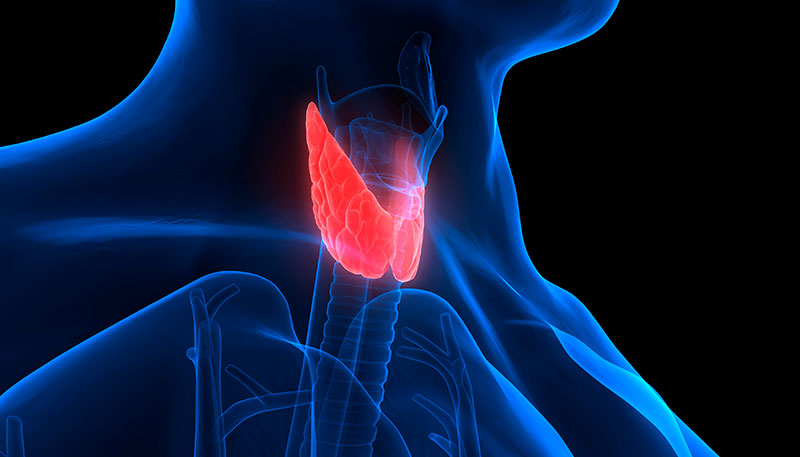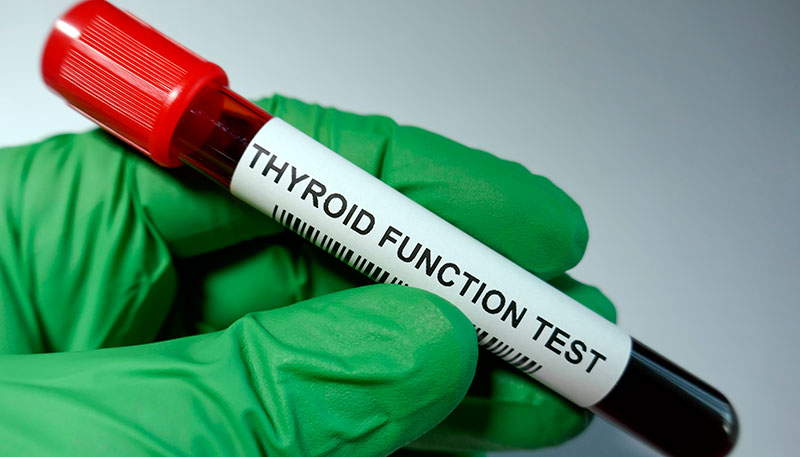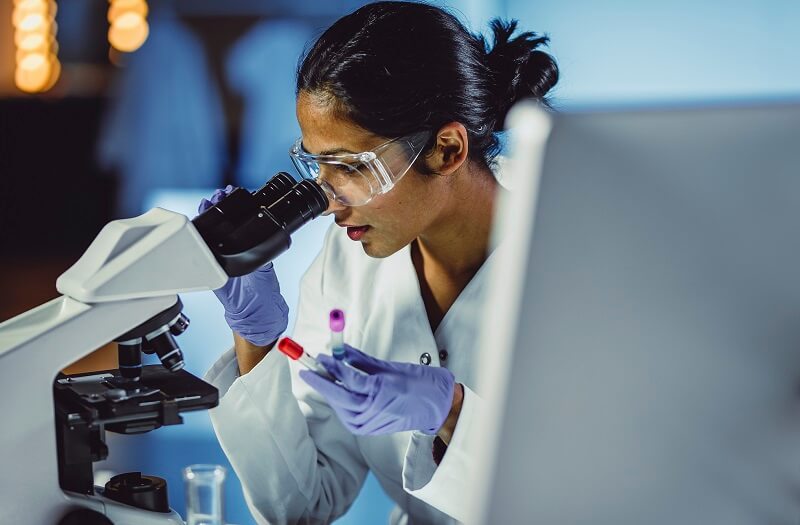- Home
- Growth Hormone
- Growth Hormone
- Growth Hormone Deficiency
- Growth Hormone Therapy
- Growth Hormone Injections
get startedThe Most Effective Hormone Replacement TherapiesCan Human Growth Hormone Cause Hyperthyroidism?
HGH therapy cannot “cause’ hyperthyroidism. However, the two hormones are intricately linked.
The thyroid gland is an endocrine gland in your neck. It makes two hormones that are secreted into the blood: thyroxine (T4) and triiodothyronine (T3). These hormones regulate or influence a number of cellular functions. The thyroid hormones influence the metabolism of your body cells. In other words, the thyroid regulates the speed with which your body cells work. If too much of thyroid hormones are secreted, the body cells work faster than normal, and you have hyperthyroidism. Hyperthyroidism is a "blanket term" for any situation where too much thyroid hormone is produced by the body.
For whatever the reason, when a person has hyperthyroidism, it means that the thyroid gland secretes too much thyroid hormone into the bloodstream. The thyroid is a complicated gland. Its function is influenced by a number of other hormones, including human growth hormone, or HGH.
Because doctors know that your level of HGH and thyroid function are intimately linked, it is natural to wonder if HGH can cause or influence hyperthyroidism.
What Is the Link Between HGH and Hyperthyroidism?
There is something known as the HPT (hypothalamus-pituitary-thyroid) axis. These are three interrelated glands all related to metabolic regulation whose performance affects one another.
Thyroid function can become imbalanced when any of the hormones secreted by any of the glands in the HPT are in decline or excess. The question of can HGH cause thyroid problems is an understandable one since HGH is a pituitary hormone. However, when properly prescribed and monitored by your doctor, hyperthyroidism is rarely, if ever, a side effect of HGH therapy.
Since the thyroid and the pituitary are part of the interdependent axis, HGH and thyroid hormones also influence one another.
How Does HGH Impact Thyroid Function?
Studies in animal models have found that when artificially reducing the level of thyroid hormone, growth hormone levels dropped as well.
Thyroid hormone and HGH have a symbiotic relationship. Each is needed in proper balance to regulate the effects of the other. Thyroid hormone is important for the normal production and secretion of adequate supplies of HGH and vice versa.
It is the hypothalamus that is largely responsible for stimulating both the thyroid gland to release thyroid hormones and for the pituitary to release HGH. The hypothalamic/pituitary/thyroid link is critical to maintaining proper balance to avoid symptoms of hyperthyroidism.
Human Growth Hormone and thyroid function are closely related.
How to Tell the Difference Between Hyperthyroidism and Growth Hormone Deficiency?
Because of the intimate relationship between thyroid function, thyroid hormones, and HGH, the symptoms of hyperthyroidism and growth hormone deficiency can mimic one another. Diagnosing hyperthyroidism can be difficult at times because the symptoms often match those of other health concerns and hormonal imbalances – including those of growth hormone deficiency.
Therefore, when a patient is exhibiting symptoms that could be indicative of hyperthyroidism or growth hormone deficiency (or both!), it is more important to find out exactly what kind of hormone imbalance he or she may be suffering from than wondering if HGH is causing hyperthyroidism.
As hormone replacement professionals, our goal is to look at the symptoms and then take the necessary blood tests that will measure all of your critical hormones to find any kind of imbalance. Hyperthyroidism is more common in women than in men and increases in postmenopausal women. Growth hormone deficiency risk also increases with age. Symptoms of hyperthyroidism include:
- Rapid heartbeat
- Sweating
- Unexplained weight loss
- Heart palpitations or arrhythmia
- Tremor in hands and fingers
- Menstrual pattern changes – females
- Sweating
- More frequent bowel movements
- Sleep issues
- Fatigue
- Brittle hair
- Thinning skin
- Muscle weakness
- Heat sensitivity
- Goiter – enlarged thyroid gland
Since growth hormone deficiency has many of the same symptoms, a doctor specializing in hormones will run diagnostic blood tests to measure the various hormone levels. Aside from providing information to use for treatment, the test results also give the doctor a baseline to watch how other hormone levels change once any hormone therapy begins.
It is not uncommon to find multiple hormone deficiencies or imbalances in adult patients with growth hormone decline (GHD). Thyroid hormone levels may be low or high in conjunction with GHD. When asking "can HGH cause thyroid problems," it is more likely to find hypothyroidism rather than hyperthyroidism from growth hormone therapy.
It is unlikely that HGH therapy can cause hyperthyroidism.
How Is Growth Hormone Deficiency Treated?
If your test results indicate that you do have an age-related growth hormone deficiency, it can be safely and effectively treated with growth hormone replacement therapy. HGH therapy is prescribed to treat patients with growth hormone deficiency. As stated earlier, when properly prescribed, HGH therapy is generally regarded as safe, and there is no reason to believe that HGH can cause hyperthyroidism.
The benefits of HGH replacement therapy have been well-documented. In 1990, a landmark medical study into the benefits of HGH therapy for age-related growth hormone deficiency (GHD) was published in the prestigious New England Journal of Medicine by Daniel Rudman, MD. Dr. Rudman did a typical double-blind study of men over 60, with half of the men in the study receiving HGH, half a placebo. The men receiving the HGH clearly showed its anti-aging benefits. Specifically, these men saw increased muscle tone, loss of fat, and regenerated skin quality. They also reported an overall increased "sense of health and well-being."
In the years since, the many life-changing benefits of HGH for men and women suffering from age-related GHD have been proven time and time again.
How is Hyperthyroidism Treated?
If your blood tests indicate that you have hyperthyroidism, there are a number of treatment options.
Treatment for hyperthyroidism depends on the cause, your age, the type of condition, and the severity of the situation. Antithyroid drugs may be used to block hormone secretion by the thyroid gland.
Radioiodine treatment may be used to damage or destroy some of the thyroid cells to decrease hormone secretion. A one-time capsule is swallowed, which releases radioactive iodine into the bloodstream to destroy the thyroid cells that make it in. The remaining healthy thyroid cells secrete a normal amount of thyroid hormone into the bloodstream.
Surgery is sometimes necessary to remove all or part of the thyroid gland. If surgical removal of the thyroid is the only treatment option, thyroid hormone supplementation will be required to avoid the opposite problem – too little thyroid hormone or hypothyroidism.
The symptoms of growth hormone deficiency and hyperthyroidism can overlap. Only your doctor can provide you with a proper diagnosis and treatment.
Now that you understand a little more about the complex relationship between HGH and thyroid hormones, why not contact us today and see if you are a candidate for the many life-changing benefits of hormone replacement therapy.
- Growth Hormone Therapy



























